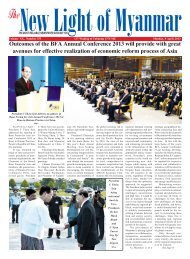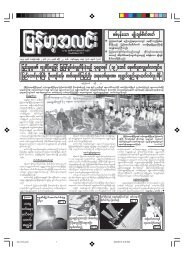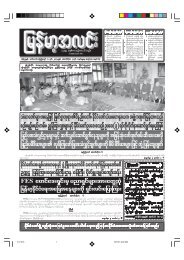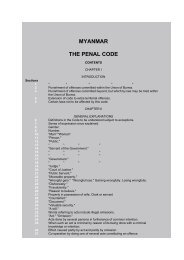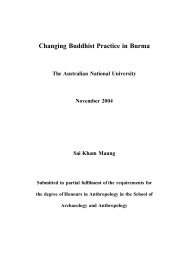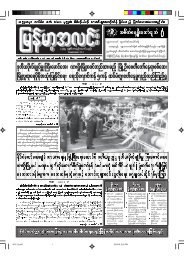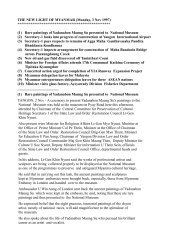"The New Light of Myanmar" Tuesday 3 July - Online Burma Library
"The New Light of Myanmar" Tuesday 3 July - Online Burma Library
"The New Light of Myanmar" Tuesday 3 July - Online Burma Library
You also want an ePaper? Increase the reach of your titles
YUMPU automatically turns print PDFs into web optimized ePapers that Google loves.
4 THE NEW LIGHT OF MYANMAR <strong>Tuesday</strong>, 3 <strong>July</strong>, 2012<br />
Science & Technology Science & Technology Science & Technology<br />
‘Stunted’ pot plants cannot reach full potential<br />
SALZBURG, Austria, 2 <strong>July</strong><br />
— Plants grown in pots never<br />
reach their full potential,<br />
images <strong>of</strong> their roots show. A<br />
medical imaging technique<br />
called magnetic resonance<br />
imaging (MRI) has been used<br />
by researchers to capture<br />
plant pot root snapshots. <strong>The</strong><br />
pictures reveal that the roots<br />
“sense the size <strong>of</strong> the pot”<br />
and restrict the growth <strong>of</strong> the<br />
plant.<strong>The</strong> findings have been<br />
presented at the Society for<br />
Experimental Biology’s<br />
annual meeting in Salzburg,<br />
Austria.<br />
Lead researcher Hendrik<br />
Poorter, from the Julich<br />
research institute in Germany,<br />
told BBC Nature that as soon<br />
as he saw the results, he repotted<br />
all <strong>of</strong> his houseplants.<br />
“I thought, you poor guys,<br />
what have I done to you?” he<br />
recalled. For the imaging<br />
study the research team<br />
focused on two species—<br />
sugarbeet and barley. Dr<br />
Poorter’s colleague Dagmar<br />
van Dusschoten produced<br />
the MRI scans. <strong>The</strong><br />
technique, used widely in<br />
medicine, reveals the water<br />
molecules within the plant<br />
roots.<br />
<strong>The</strong> resulting 3D map <strong>of</strong><br />
the roots’ structure stretching<br />
to the outer limits <strong>of</strong> the pot<br />
<strong>The</strong> MRI<br />
scans show<br />
how barley<br />
(left) and<br />
sugarbeet<br />
(right) plants<br />
arrange<br />
their roots.<br />
INTERNET<br />
shows, for the first time,<br />
exactly how restricted potted<br />
plants are. In their experiments<br />
on 80 different species, the<br />
team found that doubling a<br />
pot’s size caused a plant to<br />
grow almost half as big again.<br />
“<strong>The</strong> most surprising thing is<br />
that there seems to be no end<br />
to the pot limitation,”<br />
explained Dr Poorter.”For<br />
every plant species we looked<br />
at, pot size was the factor<br />
limiting its growth.”<br />
Within as little as two<br />
weeks <strong>of</strong> seeds being sown,<br />
the scientist explained, a<br />
plant’s roots would stretch to<br />
the edge <strong>of</strong> the pot and then,<br />
“the trouble starts”. “When<br />
they reach the edge, they send<br />
some kind <strong>of</strong> signal to the<br />
shoots to say, ‘there’s a<br />
problem—stop growing’.”<br />
Each plant appeared to be<br />
trying to escape its pot; more<br />
than three quarters <strong>of</strong> the root<br />
system was in the outer half<br />
<strong>of</strong> the container. “<strong>The</strong> inside<br />
<strong>of</strong> the pot is hardly used,”<br />
explained Dr Poorter.<br />
Research in this subject<br />
has, in the past, focused on<br />
pot size from the perspective<br />
<strong>of</strong> how small a container plants<br />
can be grown in, as the aim is<br />
to grow as many plants as<br />
possible per square metre in a<br />
commercial setting.<br />
Internet<br />
House plant heaven<br />
* House plants, such as flamingo lilies and red-edged<br />
dracaena, are known to remove indoor pollutants that are<br />
contained in paint, detergents and synthetic furnishings.<br />
* <strong>The</strong> light levels inside a house are similar to those under<br />
a tropical or sub-tropical forest canopy from where many<br />
house plants evolved.<br />
* If a house plant has grown too large, it is possible to root<br />
prune plants using the bonsai method.<br />
* Plants grown in pots that are too large are susceptible to<br />
root disease because <strong>of</strong> excess moisture retained in the<br />
soil.<br />
Falling lizards use tail for mid-air twist,<br />
inspiring lizard-like ‘RightingBot’<br />
NEW YORK, 2 <strong>July</strong> — Lizards, just like cats,<br />
have a knack for turning right side up and<br />
landing on their feet when they fall. But how<br />
do they do it? Unlike cats, which twist and<br />
bend their torsos to turn upright, lizards swing<br />
their large tails one way to rotate their body<br />
the other, according to a recent study that will<br />
be presented at the Society for Experimental<br />
Biology meeting on 29th June in Salzburg,<br />
Austria. A lizard-inspired robot, called<br />
‘RightingBot’, replicates the feat.<br />
This work, carried out by Ardian Jusufi,<br />
Robert Full and colleagues at the University<br />
<strong>of</strong> California, Berkeley, explains how largetailed<br />
animals can turn themselves right side<br />
up while falling through the air. It could also<br />
help engineers to design air- or land-based<br />
robots with better stability. “It is not<br />
immediately obvious which mechanism an<br />
animal will use to accomplish aerial righting<br />
and recover from falling in an upside-down<br />
posture. Depending on body size, morphology<br />
and mass distribution there are multiple<br />
strategies for animals to execute this behavior,”<br />
said Ardian Jusufi, lead author <strong>of</strong> the study.<br />
Lizards in their natural environment<br />
encounter various situations where they could<br />
fall. For instance, they could fall while fighting<br />
over territory, seeking food, or even mating.<br />
To avoid injuries, they must have a way to<br />
turn themselves during a fall to land safely on<br />
their feet. For over a century, people have<br />
been studying if and how cats and other<br />
mammals right themselves when they fall.<br />
Internet<br />
Despite its simple design, RightingBot<br />
rights itself in mid-air with a swing <strong>of</strong> its<br />
tail just like the lizards that inspired it.<br />
INTERNET<br />
Space exploration: staring into the dark<br />
LONDON , 2 <strong>July</strong> — <strong>The</strong><br />
European Space Agency—<br />
<strong>of</strong> which, for the time being,<br />
the UK remains a fully<br />
engaged member—has<br />
quietly cleared for take<strong>of</strong>f a<br />
space mission to address the<br />
biggest question <strong>of</strong> all: what<br />
is the universe made <strong>of</strong>?<br />
Galaxies, stars, black holes,<br />
asteroids, planets and people<br />
together add up only to a<br />
trifling 4% <strong>of</strong> all that there is:<br />
the remaining 96% is<br />
mysterious and very dark. <strong>The</strong><br />
agency’s Euclid is an optical<br />
and infrared space telescope<br />
that will be launched in 2020,<br />
to spend six years a million<br />
miles beyond Earth,<br />
<strong>New</strong> brain scanner helps paralysed people spell words<br />
LONDON, 2 <strong>July</strong> — A new<br />
brain scanner has been<br />
developed to help people who<br />
are completely paralysed<br />
speak by enabling them to<br />
spell words using their<br />
thoughts.It uses functional<br />
magnetic resonance imaging<br />
(fMRI) to help patients<br />
choose between 27 characters<br />
—the alphabet and a blank<br />
space.Each character<br />
produces a different pattern<br />
<strong>of</strong> blood flow in the brain, and<br />
Survey finds more US teens hide online<br />
activity from parents<br />
NEW YORK, 2 <strong>July</strong> —<br />
More and more teenagers are<br />
hiding their online activity<br />
from their parents, according<br />
to a US survey <strong>of</strong> teen Internet<br />
behavior released recently.<br />
<strong>The</strong> survey, sponsored by<br />
the online security company<br />
McAfee, found that 70<br />
percent <strong>of</strong> teens had hidden<br />
their online behavior from<br />
their parents in 2012, up from<br />
the device interprets these<br />
patterns. <strong>The</strong> British<br />
Neurological Association<br />
called the research “exciting”.<br />
<strong>The</strong> study appears in Current<br />
Biology journal <strong>of</strong> Cell Press.<br />
fMRI is normally used to track<br />
brain activity by measuring<br />
blood flow.<br />
<strong>The</strong> new technology is<br />
based on earlier applications<br />
<strong>of</strong> the technique, which used<br />
free-letter spelling to allow<br />
people to answer the<br />
45 percent <strong>of</strong> teens in 2010,<br />
when McAfee conducted the<br />
same survey.<br />
“<strong>The</strong>re’s a lot more to do<br />
on the Internet today, which<br />
ultimately means there’s a lot<br />
more to hide,” said McAfee<br />
spokesman Robert Siciliano.<br />
Siciliano cited the explosion<br />
<strong>of</strong> social media and the wider<br />
availability <strong>of</strong> ad-supported<br />
pornography as two factors<br />
equivalent <strong>of</strong> multiplechoice<br />
questions with just a<br />
few possible answers.British<br />
neuroscientist Adrian Owen,<br />
for instance, used fMRI to<br />
help a man believed to have<br />
been in a vegetative state for<br />
five years to answer “yes”<br />
and “no” questions by<br />
interpreting his brain activity.<br />
But the new scanner uses the<br />
entire English alphabet and<br />
the blank space.<br />
Internet<br />
that have led teens to hide<br />
their online habits. <strong>The</strong><br />
increased popularity <strong>of</strong><br />
phones with Internet<br />
capabilities also means that<br />
teens have more opportunities<br />
to hide their online habits, he<br />
said. “<strong>The</strong>y have full Internet<br />
access wherever they are at<br />
this point,” Siciliano said.<strong>The</strong><br />
survey found that 43 percent<br />
<strong>of</strong> teens have accessed<br />
fMRI is usually used to<br />
track brain activity by<br />
measuring blood flow.<br />
INTERNET<br />
simulated violence online, 36<br />
percent have read about sex<br />
online, and 32 percent went<br />
online to see nude photos or<br />
pornography.<br />
<strong>The</strong> survey reported that<br />
teens use a variety <strong>of</strong> tactics<br />
to avoid being monitored by<br />
their parents. Over half <strong>of</strong><br />
teens surveyed said that they<br />
had cleared their browser<br />
history, while 46 percent had<br />
closed or minimized browser<br />
windows when a parent<br />
walked into the room.<br />
Reuters<br />
p4(3).pmd 4<br />
7/3/2012, 3:13 AM<br />
measuring with subtle<br />
techniques and exquisite<br />
precision the geometry,<br />
distribution and acceleration<br />
<strong>of</strong> billions <strong>of</strong> galaxies across<br />
distances that extend 10bn<br />
years back in time.<br />
Modern observational<br />
science began when Galileo<br />
turned a rudimentary pair <strong>of</strong><br />
lenses on the moon and<br />
Jupiter. <strong>The</strong> paradox is that<br />
each great advance since then<br />
has successively also exposed<br />
even bigger questions<br />
about the firmament above<br />
and the emptiness around us.<br />
It was only in the 1960s that<br />
radio astronomers confirmed<br />
that spacetime, radiation and<br />
Italian regulator threatens<br />
Apple with new fines<br />
MILAN, 2 <strong>July</strong> — Italy’s<br />
competition regulator is<br />
threatening Apple Inc with<br />
further fines <strong>of</strong> up to 300,000<br />
euros ($381,000) if it does not<br />
<strong>of</strong>fer local customers a free<br />
two-year warranty as<br />
demanded by Italian law, a<br />
source close to the watchdog<br />
said on Sunday. In Italy<br />
consumers who buy<br />
electronic products and other<br />
durable goods have the right<br />
to get two years <strong>of</strong> free<br />
assistance, irrespective <strong>of</strong><br />
other warranties <strong>of</strong>fered by a<br />
manufacturer. <strong>The</strong> AGCM<br />
competition and market<br />
authority has already<br />
imposed fines <strong>of</strong> 900,000 euros<br />
on divisions <strong>of</strong> Apple, which<br />
<strong>of</strong>fers a paid technical support<br />
service, for failing to tell<br />
customers about their rights<br />
to free assistance.<br />
But months after the<br />
previous fine, Apple has failed<br />
to comply with the antitrust<br />
atomic matter all had their<br />
origins in a big bang less than<br />
20bn years ago. But even<br />
before this, observers had<br />
begun to puzzle about the<br />
behaviour <strong>of</strong> the galaxies:<br />
none <strong>of</strong> them seemed to have<br />
anything like the<br />
gravitational mass implied<br />
by their shape and structure.<br />
That was the point at<br />
which physicists began to<br />
propose a mysterious<br />
component <strong>of</strong> the universe<br />
called dark matter. This<br />
strange stuff does not shine<br />
or glow, does not bounce <strong>of</strong>f<br />
anything or announce its<br />
existence in any recognized<br />
way.—Internet<br />
request, the source said. <strong>The</strong><br />
company currently <strong>of</strong>fers a<br />
free one-year guarantee<br />
scheme, which can be<br />
extended to two years on<br />
payment <strong>of</strong> a fee. “<strong>The</strong><br />
antitrust (authority) has<br />
opened a procedure <strong>of</strong> noncompliance<br />
against Apple,<br />
complaining about two<br />
unlawful practices,” the<br />
source told Reuters.”If they<br />
do not comply, they risk fines<br />
for up to 300,000 euros,” the<br />
source said.—Reuters<br />
People wait on a street in<br />
front <strong>of</strong> an Apple store as<br />
they await sales <strong>of</strong> the new<br />
iPad in the Apple store in<br />
Munich on 16 March ,<br />
2012.— REUTERS







